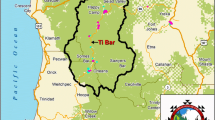Abstract
Adaptive co-management (ACM) is a key concept in science and an increasingly adopted policy response in conservation, associated with a number of positive outcomes. However, the effects and mechanisms of co-management arrangements, including the conditions under which ACM gives rise to higher levels of internal and external legitimacy, are yet to be explored. This endeavor, in turn, requires theoretically driven models providing assumptions and outlining testable hypotheses. Considering the social challenges of ACM and using an institutional change within the Swedish carnivore management system aimed at achieving legitimacy through co-management as an illustrative example, this article develops a conceptual model that encompasses conditions and possible explanations to ACM outcomes. More specifically, drawing on lessons from social theory, we model the impact of three key factors—social networks, deliberation and learning—on the external and internal legitimacy resulting from ACM arrangements. Based on the model proposed, the popular assumptions of ACM outcomes can thus be empirically scrutinized and the conditions for increased legitimacy through ACM arrangements better comprehended.


Similar content being viewed by others
References
Argyris, C. and D. Schön. (1996) Organizational learning II: theory, method and practice. Reading, Addison-Wesley
Armitage D, Plummer R, Berkes F, Arthur RI, Charles A, Davidson-Hunt I, Diduck A (2009) Adaptive co-management for social-ecological complexity. Front Ecol Environ 7:95–102
Bäckstrand K, Khan J, Kronsell A, Lövbrand E (eds) (2010) Environmental politics and deliberative democracy: examining the promise of new modes of governance. Edward Elgar Publishing, Cheltenham
Baruch-Mordo S, Breck SW, Wilson KR, Broderick J (2009) A tool box half full: how social science can help solve human-wildlife conflict. HumDimensWildl 14:219–223
Beetham D (1991) The legitimation of power. Macmillan Press, London
Benhabib S (1996) Toward a deliberative model of democratic legitmacy. In: Benhabib S (ed) Democracy and difference: contesting the boundaries of the political. Princeton, New Jersey: Princeton University Press, pp 67–94
Berkes F (2008) Commons in a multi-level world. Int J Commons 2(1):1–6
Berkes F (2010) Devolution of environment and resource governance: trends and future. Environ Conserv 37:489–500
Bill (2008/09:210). En nyrovdjursförvaltning [A new system for carnivore management]. Stockholm. Swedish Parliamentary Record.
Black J (2008) Constructing and contesting legitimacy and accountability in polycentric regulatory regimes. Regul Gov 2:137–164
Blackmore C (2007) What kinds of knowledge, knowing and learning are required foraddressing resource dilemmas?A theoretical overview. Environ Sci Policy 10:512–525
Bodin Ö, Crona, B (2008) Management of natural resources at the community level: exploring the role of social capital and leadership in a rural fishing community. World Development 36:2763–2778
Bodin Ö, Crona, BI (2009) The role of social networks in natural resource governance: what relational patterns make a difference? Glob Environ Chang 19:366–374
Bodin O, Prell C (2011) Social networks and natural resource management: uncovering the social fabric of environmental governance. Cambridge University Press, Cambridge
Bohman J (1996) Public deliberation: pluralism, complexity, and democracy. The MIT Press, Cambridge
Borgatti S, Candace Jones P, Everett MG (1998) Network measures of social capital. Connections 21(2):28–36
Burstein P (2003) The impact of public opinion on public policy: a review and an agenda. Polit Stud Quart 56(1):29–4
Burt RS (2000) The network structure of social capital. In: Straw BM, Sutton RI (eds) Research in Organizational Behaviour. JAI Press, Greenwich, pp 345–423
Carlsson L, Berkes F (2005) Co-management: concepts and methodological implications. J Environ Manage 75:65–76
Carlsson L, Sandström A (2008) Network governance of the commons. Int J Commons 2:33–54
Cash DW, Adger W, Berkes F, Garden P, Lebel L, Olsson P, Pritchard L, Young O (2006) Scale and cross-scale dynamics: governance and information in a multilevel world. Ecol Soc 11:8
Cohen J (1997) Deliberation and democratic legitimacy. In: Bohman J and Rehg W (eds) Deliberative democracy. essays on reason and politics. Cambridge and London, MIT Press, pp 67–91
Colfer JP (2005) The complex forest. Resources for the Future, Washigton, D.C., USA
Colfer JP (2011) Marginalized forest peoples’ perceptions of the legitimacy of governance: an exploration. World Dev 39:2147–2164
Council of Europe.1979. Convention on the Conservation of European Wildlife and Natural Habitats (The Bern Convention 1979). URL: http://conventions.coe.int/Treaty/en/Treaties/Html/104.htm
Cundill G, Fabricius C (2009) Monitoring in adaptive co-managment: toward a learning based approach. J Environ Manage 90:3205–3211
Cundill G, Fabricius C (2010) Monitoring the governance dimension of natural resource co-management. Ecol Soc 15:15
Cundill G, Cumming GS, Biggs D, Fabricius C (2011) Soft systems thinking and social learning for adaptive management. Conserv Biol 26:13–20
Davies AL, White RM (2012) Collaboration in natural resource governance: reconciling stakeholder expectations in deer management in Scotland. J Environ Manage 112:160–169
Dietz T, Ostrom E, Stern PC (2003) The struggle to govern the commons. Science 302:1907–1912
Dryzek JS (2000) Deliberative democracy and beyond: liberals, critics, contestations. Oxford University Press, Oxford
European Council. 1992. Council Directive 92/43/EEC on the conservation of natural habitats and of wild fauna and flora (The Habitats Directive). URL: http://eur-lex.europa.eu/LexUriServ/LexUriServ.do?uri=CELEX:31992L0043:EN:NOT
Folke C, Colding J, Berkes F (2003) Synthesis: building resilience and adaptive capacity in social-ecological systems. In: Berkes F, Colding J, Folke C (eds) Navigating social-ecological systems: building resilience for complexity and change. Cambridge University Press, Cambridge
Guerrero AM, McAllister RRJ, Corcoran J, Wilson KA (2013) Scale mismatches, conservation planning, and the value of social-network analyses. Conserv Biol 27:35–44
Habermas J (1989) The structural transformation of the public sphere: an inquiry into a category of bourgeois society. MIT Press, Cambridge, MA
Henry AD (2009) The challenge of learning for sustainability. A prolegomenon to theory. Hum Ecol Rev 16:131–140
Holling CS (1978) Adaptive environmental assessment and management. John Wiley and Sons, New York
Hønneland G (1999) The Stories Fishermen Tell: themes from the Barents Sea Fisheries. Hum Ecol 27(4):621–626
Jacobs M (1996) The politics of the real world. Earthscan, London
Jentoft S (2000) Legitimacy and disappointment in fisheries management. Mar Policy 2:141–148
Jentoft S, Chuenpagdee R (2009) Fisheries and coastal governance as a wicked problem. Mar Policy 33:553–560
Keen M, Mahanty S (2006) Learning in sustainable natural resource management: Challenges and opportunities in the Pacific. Soc Nat Resour 19:497–513
Knoke D (1990) Political networks. The structural perspective. Cambridge University Press, Cambridge
Koontz TM (2005) We finished the plan, so now what? Impacts of collaborative stakeholder participation on land use policy. Policy Stud J 33:459–481
Levi M (1997) Consent, dissent, and patriotism. Cambridge University Press, Cambridge
Lin N (2001) Social capital: a theory of social structure and action. Cambridge University Press, Cambridge
Lipset SM (1981) Political man: the social bases of politics. Johns Hopkins University Press, Baltimore
Löf A (2010) Exploring adaptability through learning layers and learning loops. Environ Ed Res 16:529–543
Matti, S.(2009).Exploring public policy legitimacy: a study of belief-system correspondence in Swedish environmental policy. PhD Diss. Luleå University of Technology
Matti S, Sandström A (2011) The rationale determining advocacy coalitions: examining coordination networks and corresponding beliefs. Policy Stud J 39:385–410
Matti S, Sandström A (2013) The defining elements of advocacy coalitions: continuing the search for explanations to coordination and coalition structure. Rev Policy Res 30:240–257
McLaverty P, Halpin D (2008) Deliberative drift: the emergence of deliberation in the policy process. Int Polit Sci Rev 29:197–214
Meadowcroft J (2004) Deliberative democracy. In: Durant F, Fiorino DJ, O’Leary R (eds) Environmental Governance Reconsidered. The MIT Press, Cambridge, MA, pp 183–217
Mutimukuru-Maravanyika, T (2010). Can we learn our way to sustainable management? Adaptive Collaborative Management in Mafungautsi State Forest, Zimbabwe. PhD thesis, CERES Research School for Resource Studies for Development, Wageningen University, The Netherlands
Ojha H, Hall A, Sulaiman RV (2013) Adaptive collaborative approaches in natural resource governance: rethinking participation, learning and innovation. Earthscan, Routledge
Olsson P, Folke C, Berkes F (2004) Adaptive co-management for building resilience in social-ecological systems. Environ Manage 34:75–90
Ostrom E (2005) Understanding institutional diversity. Princeton University Press, New York
Page BI, Shapiro RY (1999) The rational public and beyond. In: Elkin SL, Soltan KE (eds) Citizen competence and democratic institutions. The Pennsylvania State University Press, University Park, Pennsylvania, pp 93–115
Pahl-Wostl. C., M. Craps, A. Dewulf, E. Mostert, D. Tabara and T. Tallieu. (2007). Social learning and water resource management.Ecology and Society 12 [online] URL: http//www.ecologyandsociety.org/vol12/iss2/art5/
Parkinson J (2003) Legitimacy problems in deliberative democracy. Polit Stud 51:180–196
Pellizzoni L (2001) The myth of the best argument: power, deliberation and reason. Br J Sociol 52:59–86
Peters BG (1986) American public policy: promise and performance, 2nd edn. Chatham House Publishers, Chatham, NJ
Plummer R (2009) The adaptive co-management process: an initial synthesis of representative models and influential aspects. Ecol Soc 14:24
Plummer R, Armitage D (2007) A resilience-based framework for evaluating adaptive co-management: linking ecology, economics and society in a complex world. Ecol Econ 61:62–74
Plummer R, FitzGibbon J (2004) Co-Management of natural resources: a proposed framework. Environ Manage 33:876–855
Plummer R, Crona B, Armitage DR, Olsson P, Tengö M, Yudina O (2012) Adaptive comanagement: a systematic review and analysis. Ecol Soc 17:11
Provan KG, Kenis P (2007) Modes of network governance: structure, management, and effectiveness. J Public Admin Res Theory 18:229–252
Regulation (2009:1474).Regulation on game management delegations [FörordningomViltförvaltningsdelegationer].Stockholm: Swedish Parliamentary Record.
Rosenberg SW (2007) Deliberation, participation and democracy: can the people govern? Palgrave Macmillian, New York
Sabatier, P. and Jenkins-Smith, H. C., editors. (1993). Policy change and learning: an advocacy coalition approach. Westview Press, Boulder, CO
Sandström A, Rova C (2010) Adaptive co-management networks: a comparative analysis of two fishery conservation areas in Sweden. Ecol Soc 15:14
Sandström C, Pellikka J, Ratamäki O, Sande A (2009) Management of large carnivores in Fennoscandia: new patterns of regional participation. Hum Dimens Wildl 14:37–50
Scharpf FW (1999) Governing in Europe—effective and democratic? Oxford University Press, Oxford
Skogstad G (2003) Who governs? Who should govern? Political Authority and Legitimacy in Canada in the Twenty-First Century. Can J Polit Sci 36:955–973
Smoke R (1994) On the importance of policy legitimacy. Polit Psychol 15:97–110
Sterling S (2010) Learning for resilience, or the resilient learner? Towards a necessary reconciliation in a paradigm of sustainable education. Environ Edu Res 16:511–528
Stern MJ (2008) Coercion, voluntary compliance, and protest: the role of trust and legitimacy in combating local opposition to protected areas. Environ Cons 35:200–210
Treves A, Wallace RB, Naughton-Treves L, Morales A (2006) Co-managing human-wildlife conflicts: a review. Hum Dimens Wildl 11:383–396
Trevis A, Karanth U (2003) Human-carnivore conflict and perspectives on carnivore management worldwide. Conserv Biol 17:1491–1499
Tyler T (1990) Why people obey the law: procedural justice, legitimacy and compliance. Princeton University Press, Princeton, NJ
Wallner J (2008) Legitimacy and public policy: seeing beyond effectiveness, efficiency, and performance. Policy Stud J 36:421–443
Walters C (1986) Adaptive management of renewable resources. McMillan, New York
Young IM (2000) Activist challenges to deliberative democracy. Polit Theory 29:670–690
Zackrisson A (2010) Deliberative democracy and co-management of natural resources: snowmobile regulation in western Sweden. Int J Comm 4:273–292
Acknowledgments
This work has been funded by the Swedish Environmental Protection Agency, Viltvårdsfonden, and the Swedish Research Council FORMAS. We gratefully acknowledge the funding bodies for enabling this study. A special thank you to the editor and the reviewers for providing valuable and constructive comments. The paper is a collaborative work in which the authors have contributed in equal parts.
Author information
Authors and Affiliations
Corresponding author
Additional information
Communicated by C. Gortázar
Rights and permissions
About this article
Cite this article
Lundmark, C., Matti, S. & Sandström, A. Adaptive co-management: How social networks, deliberation and learning affect legitimacy in carnivore management. Eur J Wildl Res 60, 637–644 (2014). https://doi.org/10.1007/s10344-014-0827-y
Received:
Revised:
Accepted:
Published:
Issue Date:
DOI: https://doi.org/10.1007/s10344-014-0827-y




